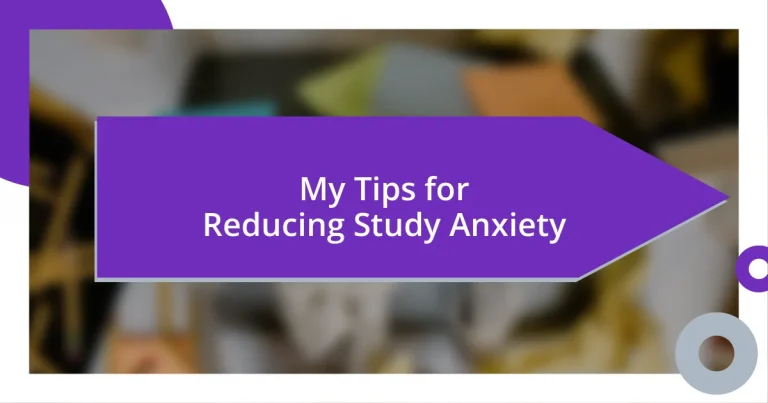Key takeaways:
- Understanding the causes of study anxiety, such as unrealistic expectations and fear of failure, is essential for effective management.
- Creating a structured study schedule, breaking study time into smaller chunks, and prioritizing tasks can significantly reduce anxiety and improve focus.
- Seeking support from peers, utilizing mental health resources, and regularly evaluating progress can enhance resilience and coping mechanisms during stressful study periods.
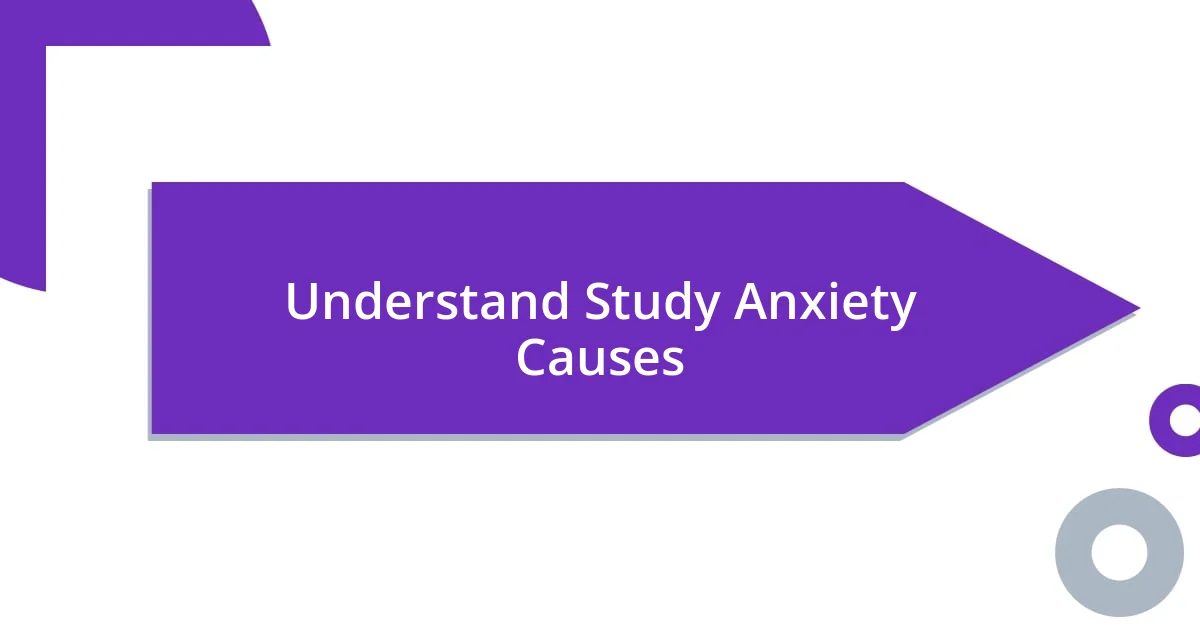
Understand Study Anxiety Causes
Understanding the roots of study anxiety is crucial. From my experience, I’ve noticed that unrealistic expectations often play a significant role. Have you ever felt that pressure to be perfect? I certainly have, and it can be overwhelming when you feel like you have to achieve flawless results.
Another factor is the fear of failure. I remember panicking before exams, replaying worst-case scenarios in my mind. That anxiety can stem from previous experiences, social comparisons, or even parental pressures. Reflecting on those moments, I realize that this kind of worry clouds our ability to focus on the material at hand.
Time management issues can also contribute to study anxiety. I’ve found that when I procrastinate, the looming deadline creates an unbearable stress that can distract me from studying effectively. Have you faced a similar situation? Underestimating how long tasks will take can lead to a frantic scramble at the last minute, amplifying anxiety levels.
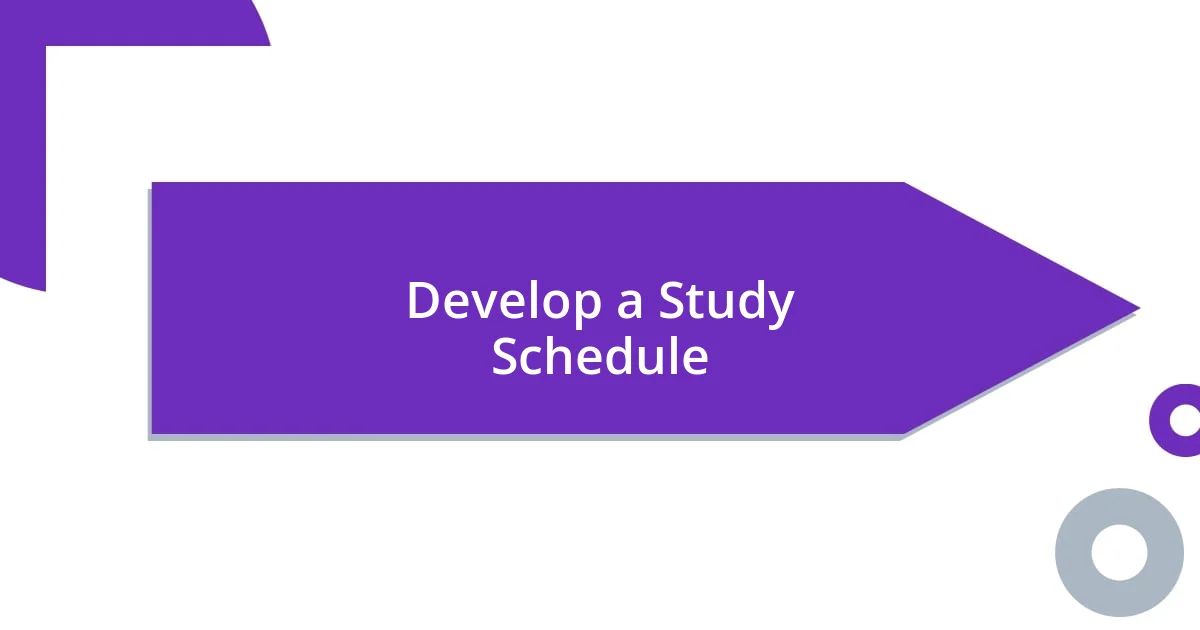
Develop a Study Schedule
Developing a study schedule is an essential strategy for managing study anxiety. I recall the days when my study approach was chaotic, filled with last-minute cramming and endless nights of panic. Once I started scheduling my study sessions, I felt a significant shift in my mindset. Creating a structured plan allowed me to see my tasks laid out clearly, reducing that overwhelming feeling of uncertainty.
One effective technique I employed was breaking my study time into smaller, manageable chunks. This method not only made my study sessions less daunting but also gave me a sense of accomplishment as I completed each segment. For instance, instead of planning to study for four hours straight, I would set aside 25 minutes for focused study, followed by a 5-minute break. That refreshing pause often revitalized my focus and energy. Isn’t it fascinating how small adjustments can lead to major improvements?
I also found it helpful to prioritize tasks based on deadlines and difficulty. By allocating more time to subjects that challenged me and ensuring I highlighted upcoming due dates, I felt more in control. Reflecting on my own experience, this sense of ownership alleviated some of that omnipresent anxiety and helped me maintain a steady progress toward my goals.
| Aspect | Traditional Method |
|---|---|
| Study Schedule | Structured with breaks |
| Time Management | Often chaotic |
| Focus | Limited due to anxiety |
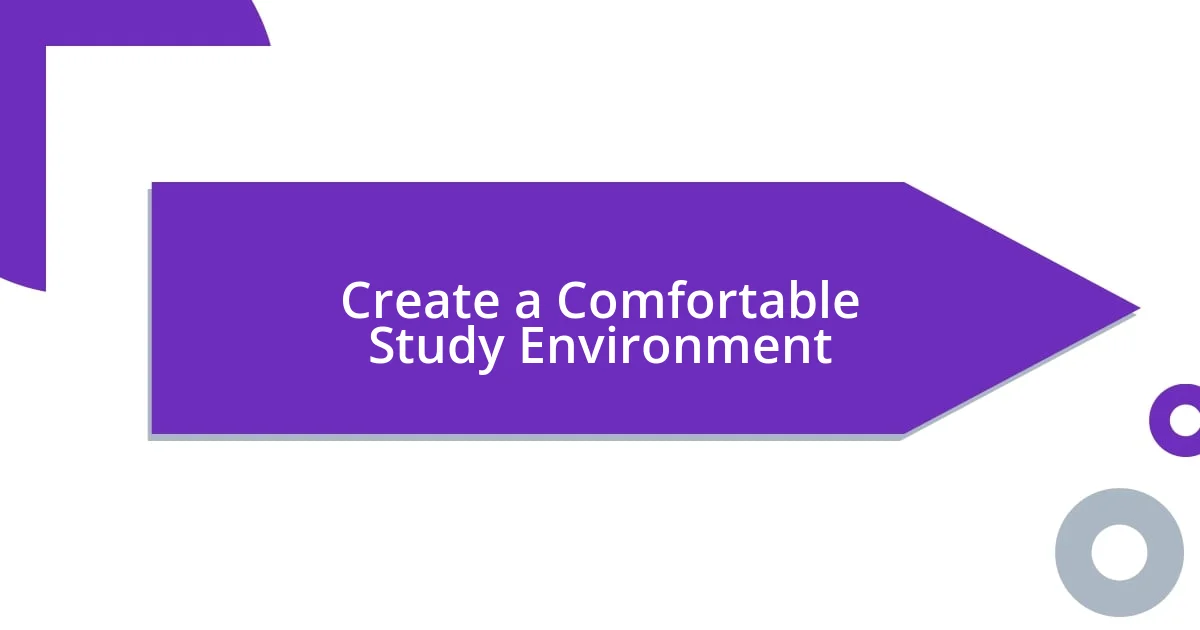
Create a Comfortable Study Environment
Creating a comfortable study environment is more than just choosing a quiet place; it’s about making that space work for you. I remember studying on a cluttered desk, where every little distraction pulled my focus away. The moment I rearranged my space, adding a cozy chair and some personal touches like photos and plants, I felt an immediate sense of calm. Suddenly, studying didn’t feel like such a chore.
To enhance your study environment, consider these tips:
- Choose a dedicated space: Find a spot that you associate with productivity, away from distractions like the TV or noisy areas.
- Control the temperature: Make sure your room is at a comfortable temperature; too hot or too cold can hinder your concentration.
- Minimize noise: Use noise-canceling headphones or calming music to drown out distractions. I often benefited from instrumental playlists!
- Organize your materials: Keep your study supplies neatly arranged to avoid the stress of searching for notes or textbooks.
- Add personal touches: Include items that inspire you, whether it’s a motivational quote or a picture that brings you joy.
By creating a personalized, organized, and distraction-free environment, you can significantly reduce study anxiety, letting you channel your energy into absorbing the material.
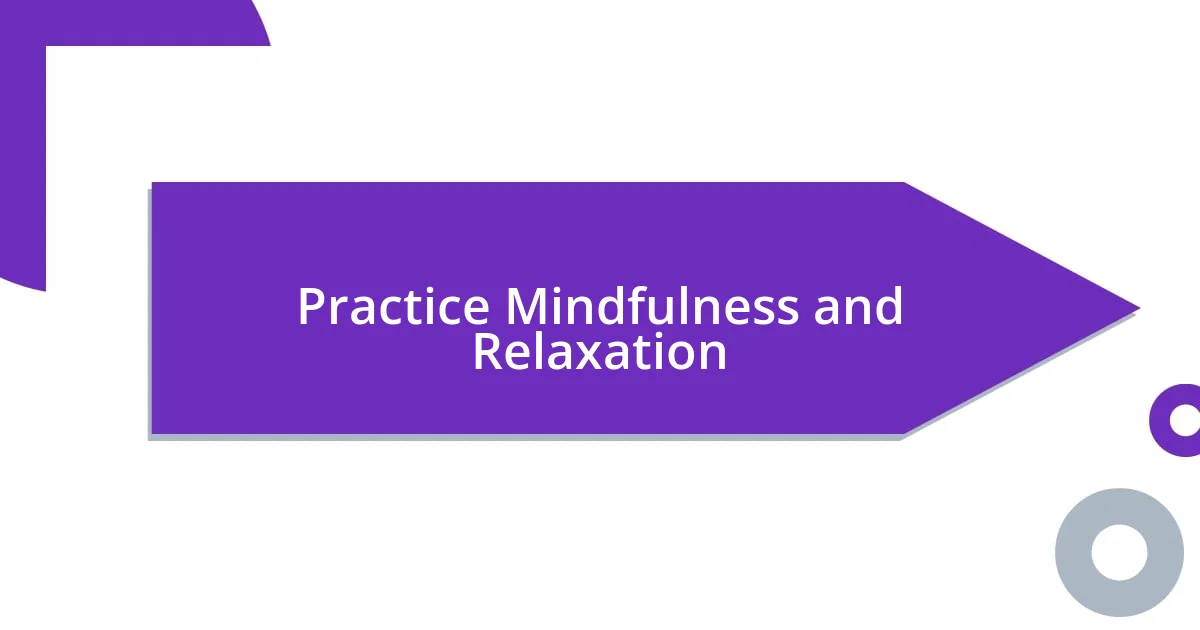
Practice Mindfulness and Relaxation
Practicing mindfulness and relaxation can be a game changer for managing study anxiety. I vividly remember the times I felt so overwhelmed by my workload that I would spiral into a panic. It wasn’t until a friend introduced me to meditation that I started to regain control. Taking just a few minutes each day to sit in silence and focus on my breath helped me clear my mind. Have you ever taken that moment to truly breathe and just be in the moment? It’s surprising how grounding it can feel.
Incorporating mindfulness techniques into your study routine can also enhance your focus. One strategy I found effective was a brief mindful break before diving into studying. I would close my eyes, take deep breaths, and visualize the tasks ahead of me becoming manageable. It shifted my perspective, reminding me that I had the ability to handle whatever was on my plate. Engaging in this practice allowed me to approach my studies with a sense of calm rather than chaos.
Additionally, I delved into progressive muscle relaxation, a technique that sounds more complex than it is. As a student, I often felt tension building in my shoulders and neck from long hours of study. By purposefully tensing and then relaxing each muscle group, I could physically release that stress. Believe me, feeling that tension melt away is truly liberating. Have you tried any relaxation methods? It’s worth exploring what works best for you to promote a tranquil mindset while studying.
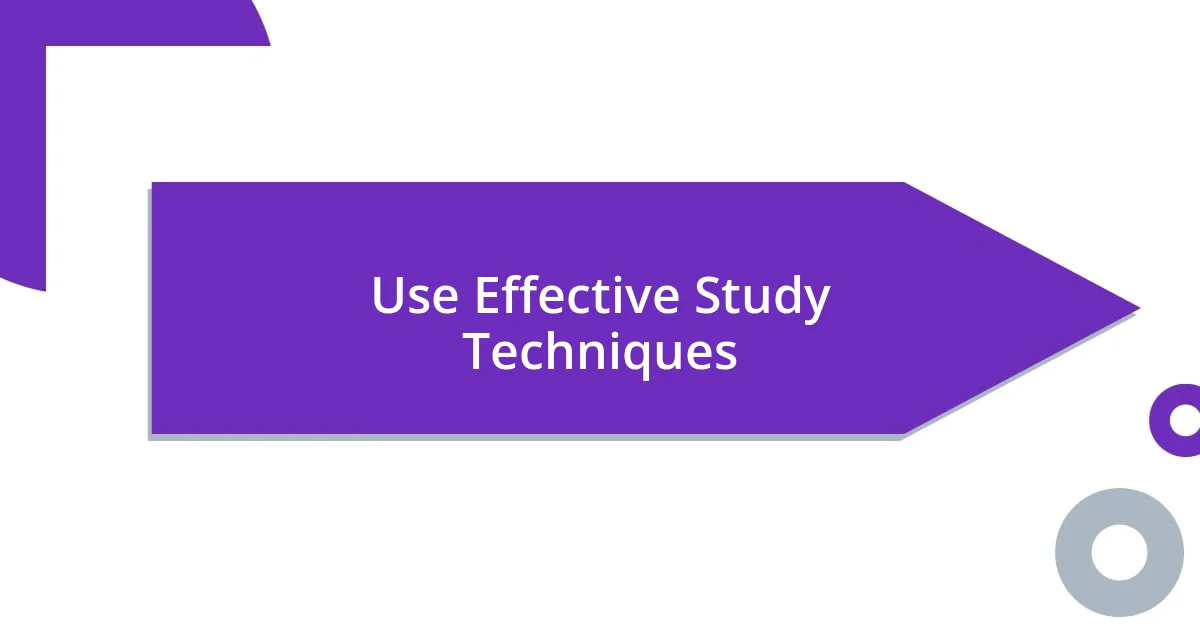
Use Effective Study Techniques
Utilizing effective study techniques can make a world of difference in how you absorb information and manage anxiety. I learned early on that breaking my study sessions into shorter, focused bursts—sometimes just 25 minutes—allowed me to concentrate better. Have you ever tried the Pomodoro Technique? It’s amazing how a simple timer can instill a sense of urgency and purpose in your study routine, helping you stay on track without feeling overwhelmed.
Another strategy I swore by was active learning, which means engaging with the material rather than passively reading or highlighting. I recall a particularly challenging history exam where I created flashcards to quiz myself. It turned studying into a fun, interactive game instead of a tedious task. Have you thought about how collaboration could deepen your understanding? Joining study groups also introduces different perspectives, making learning more dynamic and less isolating.
I can’t emphasize enough the importance of prioritizing quality over quantity. One semester, I wanted to cram as much information as possible without realizing that my brain needed time to digest everything. I started to focus on synthesizing concepts through mind maps, which helped me visualize connections and retain information better. Have you found a study method that clicks for you? Finding that ‘ah-ha’ moment in your study techniques can ease anxiety and make the process feel much more manageable.
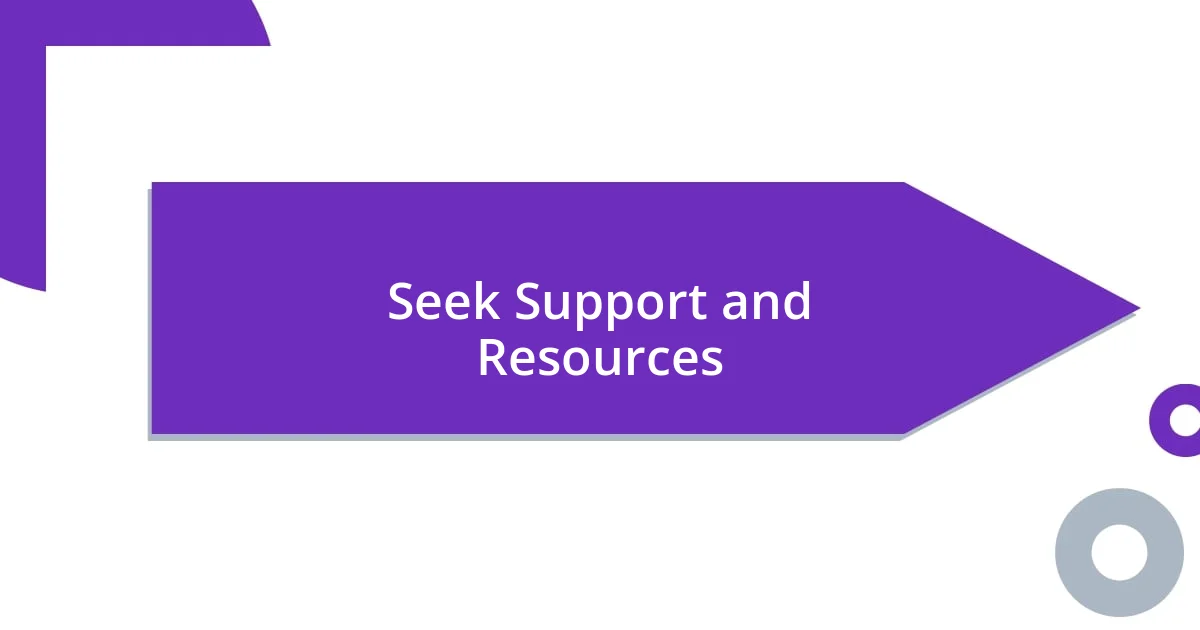
Seek Support and Resources
Seeking support and resources is essential when coping with study anxiety. I recall a particularly stressful exam period when I reached out to my academic advisor for help. The conversation felt like a breath of fresh air; they provided me with valuable resources and connected me with a tutor who helped clarify concepts I struggled with. Have you ever thought about how simply talking to someone can lift a weight off your shoulders?
Often, friends and classmates can be your best allies. I found that sharing my worries with peers not only eased my anxiety but also helped me realize I wasn’t alone in my struggles. We formed a study circle, exchanging tips and supporting each other through difficult topics. Can you imagine the relief of knowing you have a network cheering you on, ready to answer your questions?
Additionally, many universities offer mental health resources, which can be incredibly beneficial. I once hesitated to visit a counselor, thinking I could manage on my own. But that session turned out to be a turning point; the strategies I learned helped me cultivate resilience in my studies. If you’re sitting on the fence about seeking professional help, I encourage you to take that step—it could provide you with tools that transform your study experience.
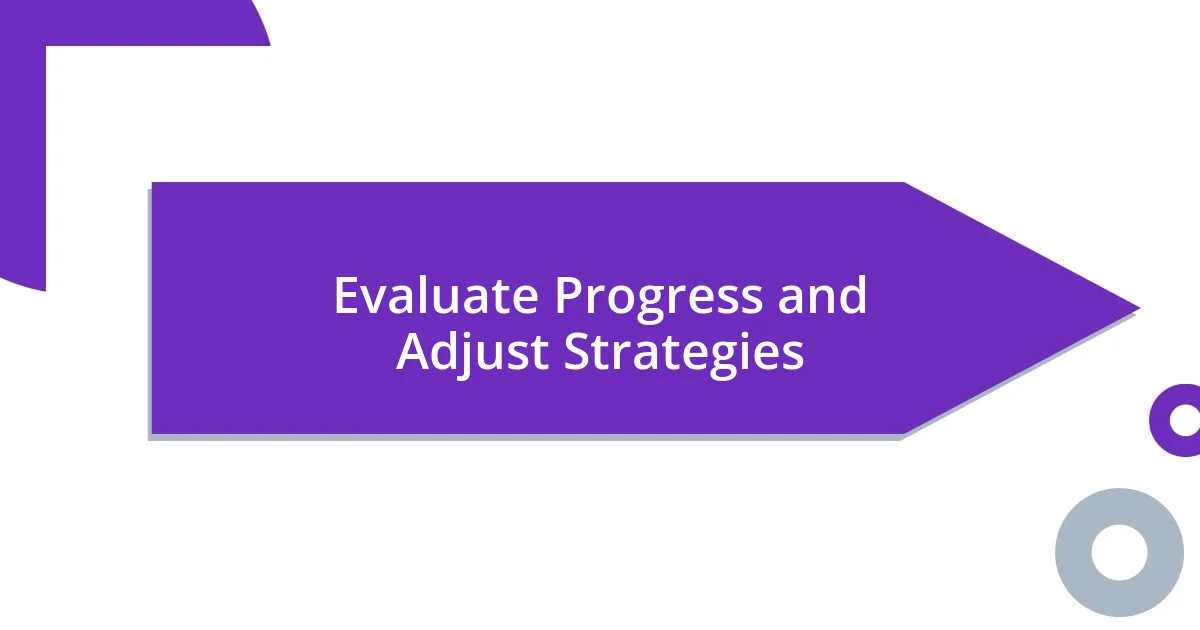
Evaluate Progress and Adjust Strategies
It’s crucial to regularly evaluate your progress as you study. I remember the time I sat down after a few weeks of cramming and realized I’d barely retained any information. It hit me hard; I felt like I was running in circles without getting anywhere. Have you taken the time to reflect on what’s working and what isn’t in your study approach? A simple self-assessment can provide clarity and guide your next steps.
Once I pinpointed the areas I was struggling with, I adjusted my strategy. For example, I noticed that I was spending too long on subjects that didn’t click for me. By reallocating my time to focus on topics where I needed more practice, I started to see improvement. If you find yourself stuck, don’t hesitate to mix things up—after all, flexibility can be a game-changer in your study routine. What small changes might help you regain your momentum and reduce that nagging anxiety?
Additionally, documenting your progress can be incredibly revealing. I began keeping a study journal, where I noted my feelings and achievements each week. One entry after a particularly stressful week, I read back and saw how far I’d come. That reflection boosted my confidence and motivated me to stay on track. Have you ever thought about how tracking your progress might put things into perspective? Recognizing your improvements—no matter how small—can alleviate anxiety and reinforce your commitment to your goals.












